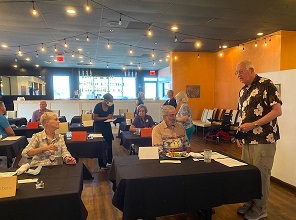PEOPLE OF ACTION – Rotary Club of Sierra Vista in These COVID Times – Rotary Foundation Major Donor Award and Presentation by COL (Ret) Henry C. Beumler on ‘How the U.S. Military got Tricare’
The Rotary Club of Sierra Vista started the weekly club meeting in the ‘live & virtual’ mode, using Zoom for the club members and visitors to the club who could not attend in person at the Tandem Restaurant in the Windemere Hotel.
Zoom Flag for Meeting Who is That Masked Man?
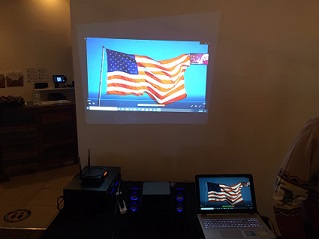
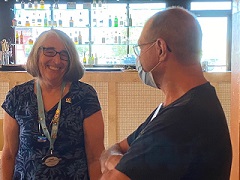
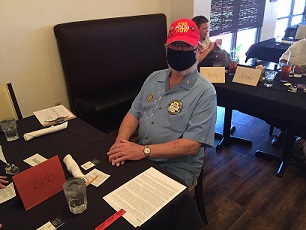
The Rotary Club of Sierra Vista started the weekly club meeting in the ‘live & virtual’ mode, using Zoom for the club members and visitors to the club who could not attend in person at the Tandem Restaurant in the Windemere Hotel.
Highlighting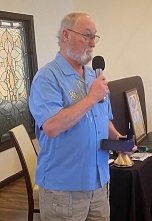 the visitor’s list was Past Rotary International Director (PRID) Phil Silvers who was visiting the club via Zoom, to present a special Rotary Foundation award to Rotarian Bob Fusco. Twenty years ago, Bob Fusco and Phil Silvers both served Rotary District 5500 in leadership positions as Rotary Club President and Rotary District 5500 Governor, respectively. Their Rotary Theme that year was providing Consistency, Credibility, and Continuity (3 C’s) in supporting Rotary International programs and goals.
the visitor’s list was Past Rotary International Director (PRID) Phil Silvers who was visiting the club via Zoom, to present a special Rotary Foundation award to Rotarian Bob Fusco. Twenty years ago, Bob Fusco and Phil Silvers both served Rotary District 5500 in leadership positions as Rotary Club President and Rotary District 5500 Governor, respectively. Their Rotary Theme that year was providing Consistency, Credibility, and Continuity (3 C’s) in supporting Rotary International programs and goals.
 the visitor’s list was Past Rotary International Director (PRID) Phil Silvers who was visiting the club via Zoom, to present a special Rotary Foundation award to Rotarian Bob Fusco. Twenty years ago, Bob Fusco and Phil Silvers both served Rotary District 5500 in leadership positions as Rotary Club President and Rotary District 5500 Governor, respectively. Their Rotary Theme that year was providing Consistency, Credibility, and Continuity (3 C’s) in supporting Rotary International programs and goals.
the visitor’s list was Past Rotary International Director (PRID) Phil Silvers who was visiting the club via Zoom, to present a special Rotary Foundation award to Rotarian Bob Fusco. Twenty years ago, Bob Fusco and Phil Silvers both served Rotary District 5500 in leadership positions as Rotary Club President and Rotary District 5500 Governor, respectively. Their Rotary Theme that year was providing Consistency, Credibility, and Continuity (3 C’s) in supporting Rotary International programs and goals. During the twenty years intervening, Bob has more than met the challenges of the 3 C’s. His generous contributions to The Rotary Foundation have been essential to securing and growing Rotary programs throughout the world. Because of this, the Rotary Foundation strives to recognize donors to express the gratitude of Rotary International (RI) for unswerving commitment, offering individual and club recognition as well as naming opportunities to enable donors to honor friends or family members with a named or endowed gift.
Rotarian Bob received a Crystal Major Donor Recognition Award and a Major Donor Lapel Pin for his unfailing support to the Rotary Foundation and Rotary International. This is a very prestigious award for Bob, and he expressed his continuing support for RI, the Foundation, his District, and his club. This was a well-deserved award for an important member of the Rotary Club of Sierra Vista.
After some announcements, the meeting was turned over to COL (Ret.) Henry Beumler for his presentation. Henry is the brother of Club President Candy and was born in Douglas, AZ, graduated from Douglas High School, and earned a Master of Education at the U of A. He later earned a Master of Health Care Administration as part of a program by the U. S. Army and Baylor University. 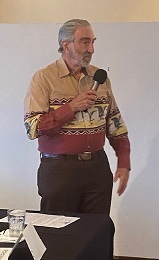

While in the U.S. Army, he held a variety of command and staff positions culminating in his assignment in 1990 as the Chief of the Managed Care Division, U. S. Army Health Services Command. In this capacity Colonel Beumler was responsible for implementing the Army's managed care program, "GATEWAY TO CARE" at 36 locations throughout the United States including Alaska and Hawaii.
COL Beumler retired from the army in 1994 and his vast experience helped him gather information about how the military had ‘developed’ a civilian health care program from a military medical facility focused program. When preparing for this talk, he contacted a former colleague to see if he kept anything from the presentations Mr. Beumler made to present on CHAMPUS and TRI-CARE when the programs were being developed. Mr. Beumler was referred to Wikipedia as the location for all his original notes on Tricare specifics. The extract from Wikipedia is quoted below.
“Tricare, formerly known as the Civilian Health and Medical Program of the Uniformed Services (CHAMPUS), is a health care program of the United States Department of Defense Military Health System. Tricare provides civilian health benefits for U.S Armed Forces military personnel, military retirees, and their dependents, including some members of the Reserve Component. Tricare is the civilian care component of the Military Health System, although for the most part, it also included health care delivered in military medical treatment facilities.
Historically, health care for military personnel and their dependents was provided in military medical facilities as promised by the military, and through a referral system, by civilian medical personnel where military physicians were not available in a certain specialty, or when and where overcrowding of a military medical facility occurred.
Active duty military personnel always have priority for care in military medical facilities. After World War II, the Korean War, and the growth of forces during the Cold War, access to care in military facilities became increasingly unavailable for military retirees and the dependents of both active duty and retired military personnel due to resource constraints and growing demands on the system. It was at this time that the concept of "space-available basis" for military retirees and military dependents was first noted. To address this problem, Congress passed the Dependents Medical Care Act of 1956 and the Military Medical Benefits Amendments of 1966. These acts allowed the Secretary of Defense to contract with civilian health care providers. This civilian health care program became known as the Civilian Health and Medical Program of the Uniformed Services (CHAMPUS) in 1966.
In the late 1980s, because of escalating costs, paperwork demands, and general beneficiary dissatisfaction, DoD initiated a series of demonstration projects. Under a program known as the CHAMPUS Reform Initiative (CRI), a contractor provided both health care and administrative-related services, including claims processing. The CRI project was one of the first to introduce managed care features to the CHAMPUS program. Beneficiaries under CRI were offered three choices – a health maintenance organization-like option called Tricare (CHAMPUS) Prime that required enrollment and offered enhanced benefits and low-cost shares, a preferred provider organization-like option called Tricare (CHAMPUS) Extra that required use of network providers in exchange for lower cost shares, and the standard CHAMPUS option that continued the freedom of choice in selecting providers but required higher cost shares and deductibles known as Tricare Standard.
In late 1993, in response to requirements in the DOD Appropriation Act for Fiscal Year 1994, the DoD announced plans for implementing a nationwide managed care program for the Military Health System (MHS) that would be completely implemented by May 1997. Under this program, known as Tricare, the United States was divided into 12 health care regions. An administrative organization was designated for each region and coordinated the health care needs of all military treatment facilities in the region. Under Tricare, seven managed care support contracts were awarded covering DOD's 12 health care regions.
The ultimate responsible organization for administration of Tricare is the U.S. Department of Defense Military Health System, which organized the Tricare Management Activity (TMA). The Tricare Management Activity contracts with several large health insurance corporations to provide claims processing, customer service and other administrative functions to the Tricare program.
Currently, there are three regional Managed Care Support Contractors (MCSCs), a Medicare/Tricare Dual Eligible Fiscal Intermediary Contractor (TDEFIC), and a Tricare Pharmacy contractor, who administers both Mail Order Pharmacy (TMOP) and Retail Pharmacy (TRRx) programs. In addition, several administrative contractors provide quality management, auditing, and statistical services.”
For more information about all of the Tricare options and services see the “Official TRICARE Website” or go to https://en.wikipedia.org/wiki/Tricare.
Before the meeting concluded, the club recognized Rotarian Elsie MacMillan for volunteering to be the club treasurer for this year – an important and critical position for the club. THANK YOU, Elsie.
In addition, PRID Phil Silvers wanted to recognize two other club members for their continuing outstanding service to Rotary District 5500. Rotarian Bob White was recognized as the Chair of the sub-committee on Global Grants for the District, and Rotarian Joe Puett was recognized as the Chair of the sub-committee for District Grants. Both Rotarians have contributed significantly to the successes of District Rotary Clubs in providing resources for community projects throughout the world. Well Done, Rotarians Bob and Joe!
A new project being planned by our Rotary Satellite Club is a ‘Drive by Health Care Appreciation Parade’ at Canyon Vista Medical Center. Rotarian Katy Regan of the Satellite Club is heading up the appreciation for health workers event. The event will be to do a drive-by thank you parade to the hospital where club members will drive up to drop off a batch of thank you cards. Other Rotary Clubs are joining the Satellite Rotarians in creating thank you cards for our healthcare workers. We also hope to "pass the hat" to fund providing some sort of food or snack for them all. Katy is taking the lead on this project, so please reach out to her if you can pitch in! (Date not yet determined.)
Lastly, after collection of this week’s ‘Happy Bucks,’ our club’s contribution to the Sierra Vista School Supply Drive was added up to be $1,745, the amount in a check to be given to Rotarian Jennifer Sorenson of the Sierra Vista Herald for the fund raising project. Another “WELL DONE, Rotarians!”
(Prime source Wikipedia, COL (Ret.) Henry C. Beumler, Prepared by Rotary Club Reporter, John Spengler)
Tandem Restaurant
